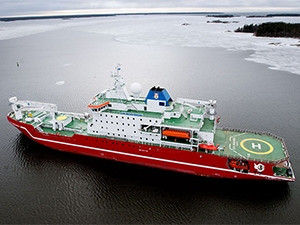
Forty-one postgraduate students have been selected from 15 South African universities and technikons to study ocean dynamics, life in the sea, marine instrumentation and data analysis on a 10-day voyage on board the government-owned polar research vessel, the SA Agulhas II.
The programme, SEAmester - SA's Class Afloat, aims to introduce marine science as an applied and cross-disciplinary field to students who have shown an affinity for these core science disciplines.
Vessel Agulus II is a research vessel built in 2012 and currently sailing under the flag of SA. It is 134m long overall, with beam of 22m. Her gross tonnage is 12 897 tonnes.
Students will be able to combine theoretical classroom learning and the application of this knowledge through ship-based, hands-on research, working alongside specialist scientists in internationally relevant research activities. Some of these students will be sailing, and perhaps even seeing the ocean, for the first time.
The Department of Science and Technology (DST) is sponsoring the voyage on the SA Agulhas II, which is owned by the Department of Environmental Affairs (DEA), to increase awareness of the ocean's physical and ecological response to climate change, and to inspire and attract students to the marine sciences.
Associate professor Isabelle Ansorge of the Department of Oceanography at the University of Cape Town is directing the programme. Tahlia Henry, a former Cape Peninsula University Technikon student, is the SEAmester co-ordinator.
SEAmester will run parallel to the Agulhas System Climate Array (ASCA) - an international oceanographic project with partners from SA, via the SA Environmental Observation Network, the US and the Netherlands, and funding support from the DST and DEA, the US National Science Foundation and the Royal Dutch Institute for Sea Research.
ASCA is designed to provide long-term observations of Agulhas Current volume, heat and salt transport and its variability from mesoscale (eddies), through seasonal to inter-annual timescales. The ASCA shelf and tall moorings were deployed in 2015 and extend 200km offshore through the core of the Agulhas Current, with Current and Pressure Recording Inverted Echo Sounder measurements extending the array to 300km offshore.
The SEAmester/ASCA cruise will provide valuable ocean data to better understand the role of the Agulhas Current in a global ocean and provide an exciting scientific background for SEAmester to engage in - not only in the science but with the ASCA core scientists, say the organisers.
Share